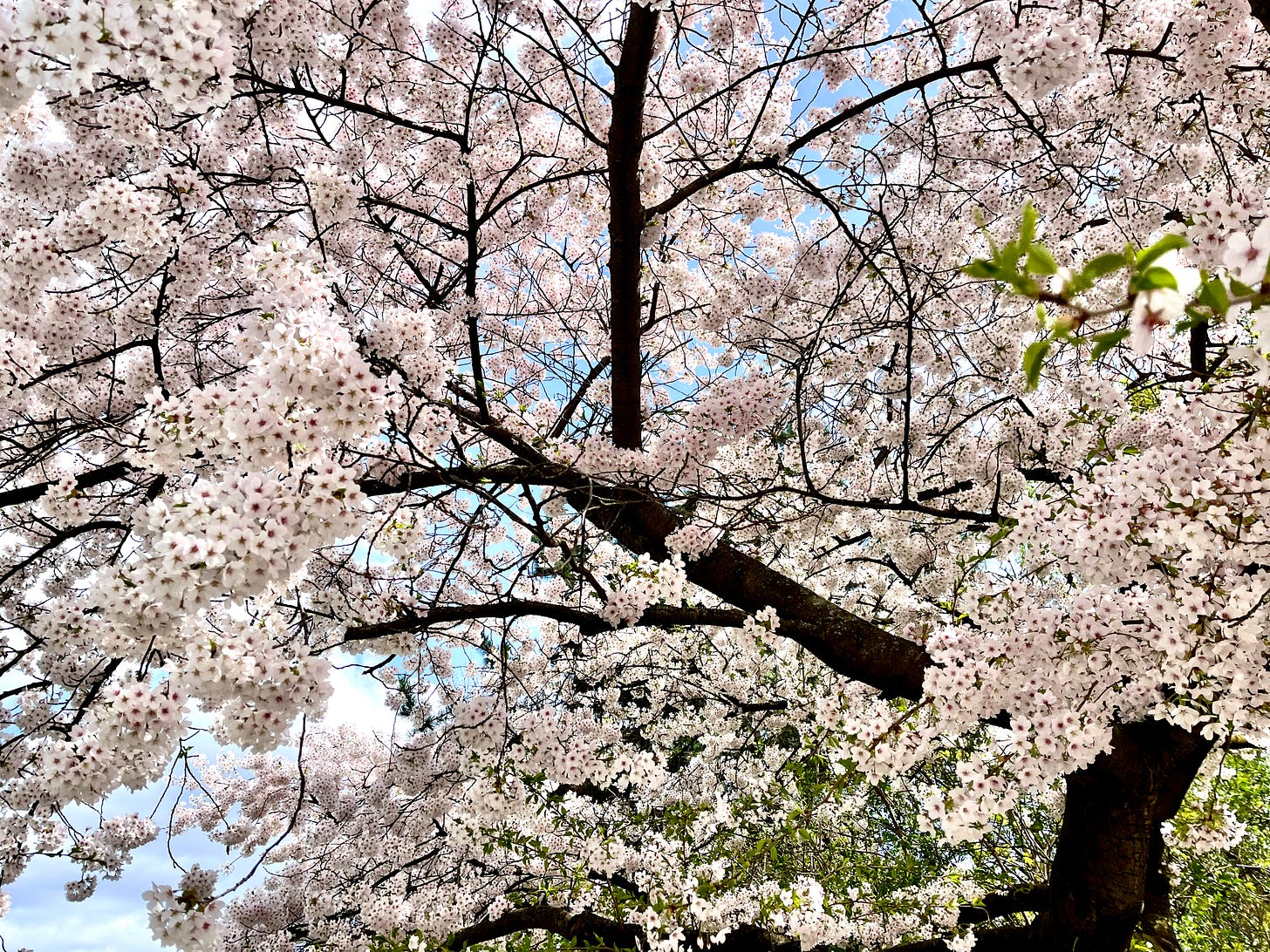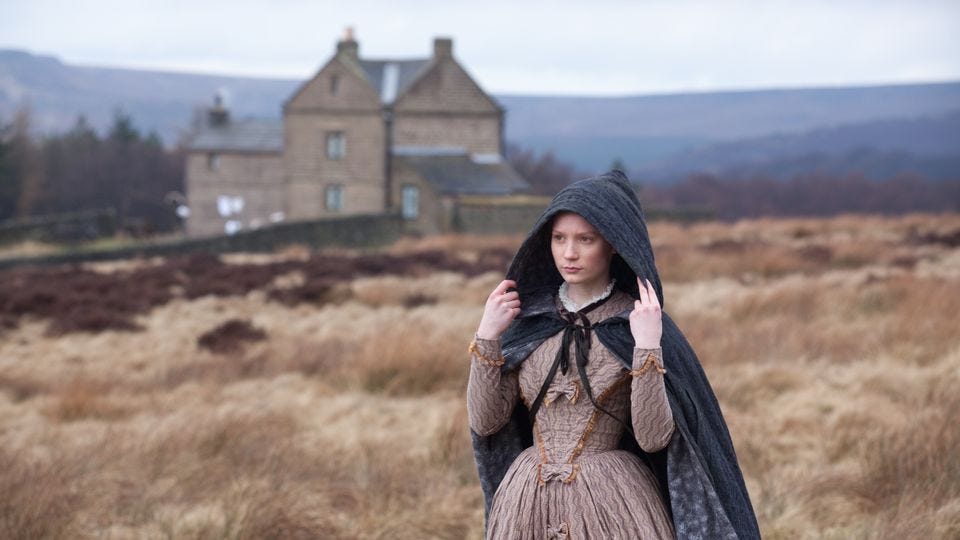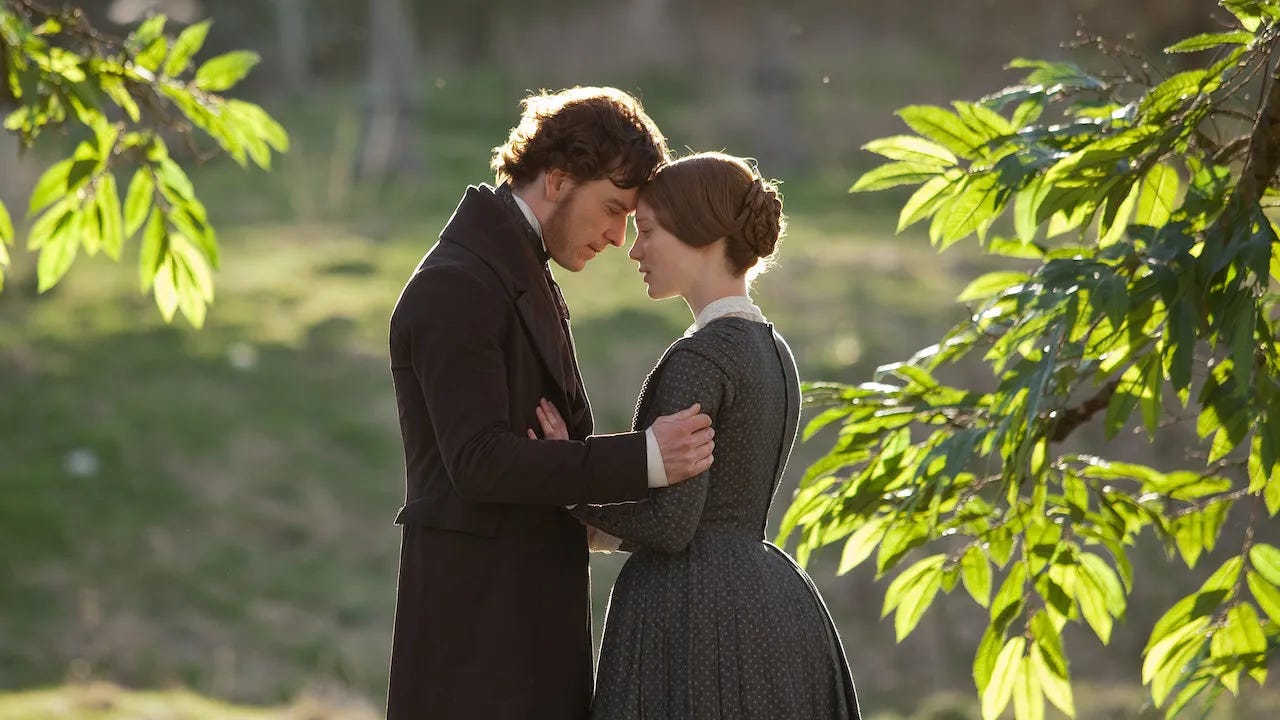On Holding Your Own, in Writing and Love
On rereading JANE EYRE, and whether or not I am capable of having a worthwhile idea. Also, other books.
Hello hello!
It’s been well over a month since I sent one of these. I would feel guilty about it, but I did warn you that I’d likely be writing less often but aiming to be more intellectually serious or something. So of course I’ve spent the last few weeks fretting that I didn’t have anything of adequate substance to write about, and avoiding it altogether. Or avoiding this format, lest I fall short of acceptable profundity.
But this is stupid, because how do you even know if a thought has “adequate substance” until you begin to pursue it? Isn’t that the whole point of writing? Every now and then I do have an idea almost fully worked out in my head before I write anything down (as with this post), so I sometimes trick myself into thinking if that doesn't happen, the idea is a dud. But that’s just me being intimidated by the process… which is actually just me being insecure about the worth of my thoughts, and their potential to yield something interesting.
A couple of weeks ago I was scrolling through the Substack Notes feed, and stopped on the following quote:
Your true talents come so effortlessly to you that you likely underestimate their value to others. Your true passions are best discovered by reflecting on what brought you joy as a child.
This came from an incredible interview journalist Christian Näthler did with a disillusioned marketing exec who quit her job to live in the woods. I highly recommend you read the whole thing - I’ve done so about five times, and it’s making me feel at least somewhat more zen about the immolation of the global economy, and also that chunk of extra money I put in the stock market in January.
But I digress.
The quote caught my eye for a couple of reasons. One is that the childhood bit directly reflects some of what was bouncing around in my head when I wrote my last post. The other is that the first sentence captures something I struggle with constantly, which feeling like every idea I have must be dismally obvious, purely by virtue of the fact that I thought of it. No amount of outside affirmation over the course of however many years will ever fully convince me that I am not, on some level, extremely dull.
Case in point, I recently finished rereading Jane Eyre for the first time since seventh grade. I had many strong reactions, but was hesitant to write about them because what worthwhile thing could I possibly say about one of the most analyzed books in the entire canon? But that hesitance feels relevant, because you know what makes Jane Eyre an astonishing and extremely gripping read? The fact that it’s written with such absolute authority.
There are two different levels of authority happening here. The first is Jane the character’s authority over her own mind and concept of self. The second is the authority of the voice in which the book is written - which is nominally Jane’s voice, but is also Charlotte Brontë’s authorial one.
A lot of ink has been spilled about Jane Eyre as a revolutionary assertion of female agency and self-determination, in an era that fetishized women as docile and submissive. A lot of ink has also been spilled about how the particular intensity of Jane Eyre’s first-person narration, a relatively new device at the time, reinvented the novel as means to explore the individual psyche - and correspondingly, altered how people thought about the entire concept of the self.
These two things interest me most when taken together: the reason the book’s supposedly feminist themes land is because Jane Eyre is such a fucking person. Quite possibly one of the most alive people who has ever narrated her own story.
If you are opposed to reading “spoilers” of incredibly famous novels written two centuries ago, you should skip the next section. If this in fact sounds exactly like your cup of tea, you can show your enthusiasm and….
In a very, very famous passage from the scene where Rochester tries to manipulate Jane into confessing her feelings without having to volunteer his own, Jane finally loses it (Rochester and Heathcliff are the canonical Scorpios of literature, I will not be taking questions at this time):
“Do you think I am an automaton? — a machine without feelings? and can bear to have my morsel of bread snatched from my lips, and my drop of living water dashed from my cup? Do you think, because I am poor, obscure, plain, and little, I am soulless and heartless? You think wrong! — I have as much soul as you — and full as much heart! And if God had gifted me with some beauty and much wealth, I should have made it as hard for you to leave me, as it is now for me to leave you. I am not talking to you now through the medium of custom, conventionalities, nor even of mortal flesh: it is my spirit that addresses your spirit; just as if both had passed through the grave, and we stood at God's feet, equal — as we are!”
People tend to get stuck on the last sentence: Jane’s insistence that she and Rochester, who is both very rich and male, are fully equal before God. But the dramatic impact of this passage, which is huge in context, exists not only because Jane insists on her own humanity in spectacularly eloquent terms, but because the book illustrates it. We have spent the last 175-ish pages watching Jane love, lust, contemplate nature, stew with jealousy, yearn for belonging, rage at those who have wronged her, and rail against hypocrisy with unfailing conviction. She spends her free time making slightly surrealist paintings based on whatever she locates in her imagination. She’s also incredibly stubborn, in the manner of people who know deep down that they’re right.
Everything we encounter is communicated to us through the lens of how it strikes her and how she feels about it. This is what great first person narration does: the author describes the protagonist via the way the protagonist describes the world. And Jane Eyre is written with drama, surgical precision, and extreme force - which means that Jane Eyre is a vivid, brilliant, and extremely forceful person. She has complete authority over her internal experience, and a major dramatic engine of the book is her determination to keep hold of her concept of self - even in the face of loneliness and destitution, and (especially) within the overwhelming emotions of passionate love.
When she agrees to marry Rochester (the first time), she spends their brief engagement insisting, over and over, that he has to marry the person she is, rather than the person he’s suddenly invented to suit his own heroic fantasy of their love. He tells her:
“You shall sojourn at Paris, Rome, and Naples: at Florence, Venice, and Vienna: all the ground I have wandered over shall be re-trodden by you: wherever I stamped my hoof, your sylph’s foot shall step also. Ten years since, I flew through Europe half mad; with disgust, hate, and rage as my companions: now I shall revisit it healed and cleansed, with a very angel as my comforter.”
I laughed at him as he said this. “I am not an angel,” I asserted; “and I will not be one till I die: I will be myself. Mr. Rochester, you must neither expect nor exact anything celestial of me—for you will not get it, any more than I shall get it of you: which I do not at all anticipate.”
This is followed by a whole section of her railing at Rochester for trying to reoutfit her in fancy clothes and jewelry that make her feel ridiculous and are not to her taste. She protests that if he buys her a new wardrobe, “you won’t know me, sir; and I shall not be your Jane Eyre any longer, but an ape in a harlequin’s jacket—a jay in borrowed plumes. ” He takes her shopping anyway, and she winds up stewing with “annoyance and degradation” at being “dressed like a doll,” and she worries that she will owe it to him to become someone she’s not. Soon after, she insists that she should remain Celine’s governess even after their marriage so that she can buy clothing to her actual taste out of her own salary.
Things escalate when after this argument, he accuses her of being a hardass for not swooning over a song he sang her:
I assured him I was naturally hard—very flinty, and that he would often find me so; and that, moreover, I was determined to show him diverse rugged points in my character before the ensuing four weeks elapsed: he should know fully what sort of a bargain he had made, while there was yet time to rescind it.
She then sets about to constantly give him a hard time in order to inoculate their relationship against the overwhelming power of his imaginings about her - because she is terrified she will disappoint him, because they offend her sense of self, and also because her love for him is so overwhelming that she’s hanging on to her sense of self by a thread.
Yet after all my task was not an easy one; often I would rather have pleased than teased him. My future husband was becoming to me my whole world; and more than the world: almost my hope of heaven. He stood between me and every thought of religion, as an eclipse intervenes between man and the broad sun. I could not, in those days, see God for His creature: of whom I had made an idol.
Does anybody write about the contradictions of romantic passion, and the struggle between the Self and the Beloved, like the Brontë sisters?* Not really, to be honest. Which is why even after we find out that Rochester has been lying about being married and keeping his wife locked in the attic, and then we watch him justify this mess in a fit of self-pitying theatrics, it’s still heartrending to watch Jane sit with the devastation of all of her dashed hopes, and wrestle with her desire to make excuses for him while despairing that he must never have truly loved her, but simply been in the grips of a lustful delusion. This man, who is a pretty huge shit to be honest, but who is warm and brilliant and stays up talking to her until past midnight, and who really digs her stubbornness and her weird paintings.
After Rochester has reassured her, insisting spectacularly that what he wants more than anything is for the “resolute, wild, free thing,” inside her to unite with his own spirit of her own free will, she realizes that for the sake of her self-respect, she has to leave him rather than betray that thing by agreeing to be his mistress.
That chapter is an experience.
Eventually this hot mess of a power struggle reaches its apotheosis, and she marries him. But only once his disastrous excesses of lifestyle and temperament have been quite literally burned away, and she goes out and discovers friendship, family, and financial autonomy elsewhere. Now, finally:
I am my husband’s life as fully as he is mine. No woman was ever nearer to her mate than I am: ever more absolutely bone of his bone and flesh of his flesh […] To be together is for us to be at once as free as in solitude, as gay as in company. We talk, I believe, all day long: to talk to each other is but a more animated and an audible thinking. All my confidence is bestowed on him, all his confidence is devoted to me; we are precisely suited in character—perfect concord is the result.
They have merged entirely, because they are in balance. Nobody is taking over anyone else. It’s quiet and intimate and exquisitely romantic.
It’s also a big fat Christian allegory, because that was Charlotte Brontë’s personal jam, but that’s a whole other topic.
(*Wuthering Heights, which I have read at least three times as an adult, is sort of about the same stuff but in that iteration, the lovers annihilate each other in a spectacular inferno of jealousy, self-loathing, and rage, and their descendants have to pick up the pieces. It’s fucking epic.)
Anyway, despite the many ways in which Jane Eyre is an object of 19th century Britain (racism! colonialism! madwomen in attics!), I was astonished by how modern it seemed. Not because it is “feminist” (and I’d argue it’s very imperfectly feminist, but that’s another 10k words) but because it is still relatively rare to encounter a woman - a woman character, a woman author - who dares proclaim so forcefully that they are their own authority, and their consciousness is a vehicle for universal human truth. Let alone divine truth.
It obviously requires skill - to write with real conviction requires a command of language that can only be achieved through talent and a huge amount of hard work. But lots of writers are incredibly skilled; not all of them write like this. It seems to be a quality of that ineffable thing called voice, and the confidence that voice carries when the writer herself has extreme conviction in her own ideas and abilities. Or at least can inhabit that conviction while she’s sitting down and doing the thing.
When Joan Didion died, Zadie Smith had this to say about her in The New Yorker:
When women writers of my generation speak in awed tones of Didion’s “style,” I don’t think it’s the shift dresses or the sunglasses, the cigarettes or commas or even the em dashes that we revere, even though all those things were fabulous. It was the authority. The authority of tone. […] I remain grateful for the day I picked up “Slouching Towards Bethlehem” and realized that a woman could speak without hedging her bets, without hemming and hawing, without making nice, without poeticisms, without sounding pleasant or sweet, without deference, and even without doubt.
I think this is very correct, and I don’t think the awe is as generational as Smith makes it out to be - though there are certainly more women who write this way than there used to be, and many of them are among my favorites. But it can take a fair amount of gassing yourself up, whereas so many male writers seem to reflexively stake a claim for universal truth (or god forbid, the truth about women), even when what they’re saying is horseshit. So much of being female in public is still bound up in the assumption of male authority, and learning how to project a (nonexistent) perfect level of confidence that will command respect without putting anyone off. All of this inevitably has an impact on how assertive you are even within the privacy of your own thoughts - and it absolutely affects how women write, as well as how we are socially conditioned to behave in love.
So maybe I also liked reading Jane Eyre so much because I found it both “relatable” and “aspirational” (horrors). And it made me ponder how both writing and love test your ability to maintain authority. Part of what is required to do either of them right is to insist on the validity of your own consciousness, even in the face of the overwhelming urge to do the opposite. Trusting the integrity of your own mind, wading through its contents, and then asserting what you find there out in the world to be rejected or embraced, is an act of enormous faith in yourself. Not for nothing, author and authority have the same root.
Other things I have also read recently
That Facebook Memoir - I actually didn’t read this voluntarily; I was assigned it at one of my jobs. But I’m going to mention it because it’s been everywhere and quite honestly… holy shit. As if we needed yet more evidence that our world is being run by absolute fucking assclowns with absolutely no sense of ethics. Between this and all the stuff about Meta training their AI with millions of pirated books because they simply didn’t feel like paying for them, I am pretty much ready to go live in the woods with Katherine Pomfret and distribute all of my future writings by leaflet (again, you should read that interview) .
Speaking of books I read for work, I also want to mention The Audition by Katie Kitamura, which was published just a few days ago but which I actually read last fall. I’ve lamented that my work often involves reading a lot of junk, but every now and then I get to read really great shit, sometimes long before it’s actually published, which means I can’t put it in this newsletter. But now that it’s been published, I will very heartily recommend it. A really great and very weird exploration of how we inhabit different identities in different areas of our lives - especially the relational ones - and how this can complicate our sense of self and our sense of others.
Girl by Edna O’Brien - I picked this up in a bookstore because I wanted to read something by Edna O’Brien, and while the jacket was covered in lavish praise from pretty much every media outlet you could imagine, there was no concrete description of what it is actually about. So I went in blind, which was maybe good because I’m not sure I would have read it if I knew what I was getting myself into. Anyway, it was truly an astonishing piece of writing (speaking of authority), it goes by like lightening, and I absolutely do not recommend reading it before you go to sleep because it absolutely gave me nightmares. But it will definitely not be the last Edna O’Brien book I read.
Signing off for now
I’m not going to estimate when I’ll send another one of these - I will before too long, but I’ve also promised myself (as well as a novelist friend / accountability partner) that I’m going to come up with some sort of functional outline for the first one of my novel projects by May 1st. So I need to make sure I do that, in addition to some other things that are connected to actually earning money. If money still exists in a month! Ha ha, the world is fucking hilarious.
Look at you! You read all the way to the end! This was a long one, so you must really have been enjoying yourself.
If you liked this piece but don’t want to commit to a paid subscription, you can show a little love and…







